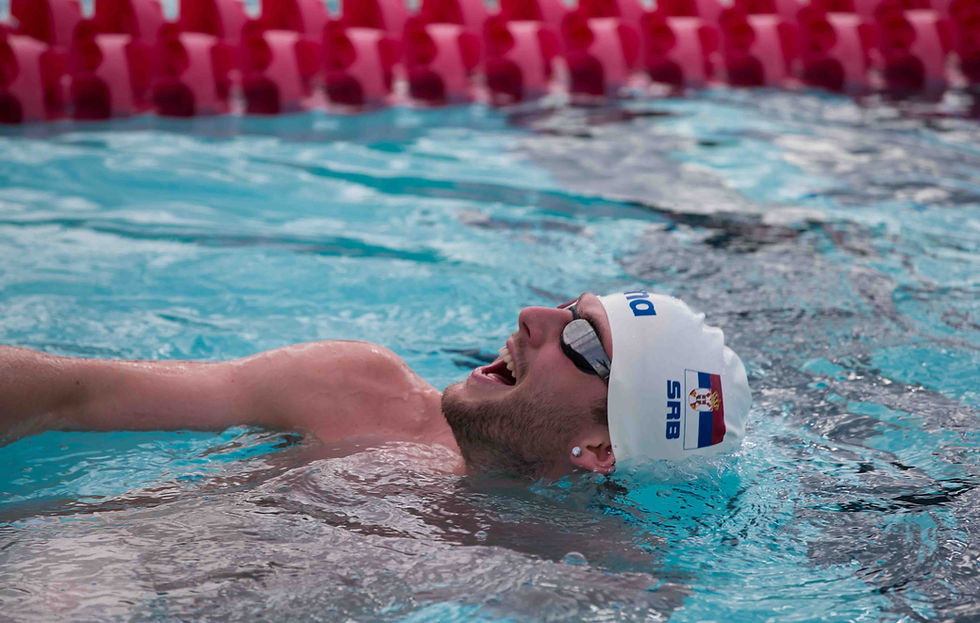Blog gost: Bogdan Knezevic
- Feb 4, 2019
- 4 min read
Updated: Apr 1, 2020
How hard it is to get yourself motivated after you’ve won a medal, to jump into the swimming pool again, to train and stay committed to your goals, are the questions answered for the Swimming Dad by our #Blog guest, Bogdan Knežević, a former Serbian national team swimmer, who is still the record holder for 200m and 400m medley and 200m breaststroke. Bogdan is studying at the Oxford University.
1. Motivation after winning a medal: How did you motivate yourself to get up and jump into the pool again after you have won a medal?
I think my answer depends on what the medal itself was: whether it was a medal at a really important competition or at a smaller one. When I won medals at smaller competitions, or if I swam a time I was happy with, I thought of this as proof that my training program was working and that I was on track to achieve whatever main goal I had (for example, qualifying for a team at the end of the season, or winning a medal at a larger competition). I think I was always hungry for doing well at competitions. I also found ways to channel my excitement into motivation for pushing myself more and training harder - after winning a medal at a big competition, we all feel very excited and full of energy. I would recommend finding a way to turn that excitement into motivation to do even better, to work even harder, because there are always ways that we can improve. Often, I would have very good workouts right after winning a medal (even the next day), because I would use the excitement from the medal to inspire myself to keep pushing and training and achieving more. I think that the true magic behind this is the realization that the medal (or the final we qualify for, or the best time we swim, or whatever) represents personal growth and achievement, and we should never stop trying to grow as individuals.
2. Motivation for training: How to stay motivated and persistent?
I think it’s very important to realize that training will be many different things. Sometimes it will be very difficult, sometimes it will be very fun, sometimes it will feel impossible, and sometimes it may even feel very easy. All of this is a normal part of sport. I think it’s important to try and understand what the main purpose of a practice is. For example, there might be a week where your coach wants you to really work on one specific technique. Or you might have a month where your main goal is fitness, or strength, or speed. There are so many different reasons for training, and I always found that it was much easier to stay motivated for training if I knew why I was doing what I was doing. It’s also important to realize that not everything will always be smooth, and that’s ok. Sometimes I felt horrible after practice—slow, weak, low energy. This is a normal part of any athlete’s life, figuring out how to fix these feelings and how to improve. If you can do that, if you can find a way to re-motivate yourself, you will emerge stronger than before. If you’re really struggling with motivation for a long time (maybe weeks, or longer) then I think it’s important to have an open and honest conversation with your coach and support staff or your teammates, to see what they think and how they can help. People say that swimming is an individual sport, but that’s not really true. There are so many people around you who contribute to your success in the pool, and you’re all part of the same sports family, which means taking care of each other and helping each other out.
3. Motivation after achieved goals: What is the right move from your own experience as a top athlete?
For me, it was really important to constantly set goals, and to make sure that they were both short term and long-term. This way, even after I achieved a specific goal, I knew what the next step was, and I could already start planning for that. Usually, I worked backwards. For example, there might be a really important competition at the end of the season that I wanted to do well at. I would set that as a goal, and then I would ask myself “OK, so, to achieve this, what other ‘smaller’ goals do I need to achieve beforehand?” This might be something like swimming a certain time at a competition 6 months before the main one. Then I would repeat this process – what do I need to do between now and 6 months from now in order to swim that time? The goal wasn’t always times at a competition; it could also be finishing a challenging set, or learning how to do a new exercise well, or improving my sleep habits. Usually, I had goals for each month at the very least, which meant that any time I achieved one goal, I knew what the next stepping stone was to get closer to the ‘ultimate’ goal. Once that main goal is achieved, I do think it’s important to take a bit of a break. It doesn’t need to be long (sometimes it was just two or three weeks after one full year of work), but I think that the breaks are important so that you can mentally reset yourself. Then, when you’re refreshed and ready to come back to training, it’s really important to discuss what you learned – regardless of whether you achieved or didn’t achieve your main goal, I think it’s really important to sit down and analyze what worked well, what needs improvement, and what the new goals are.



























































Comments